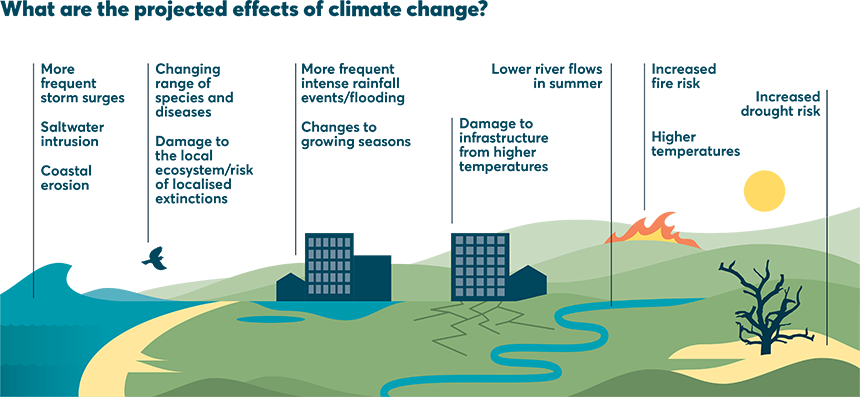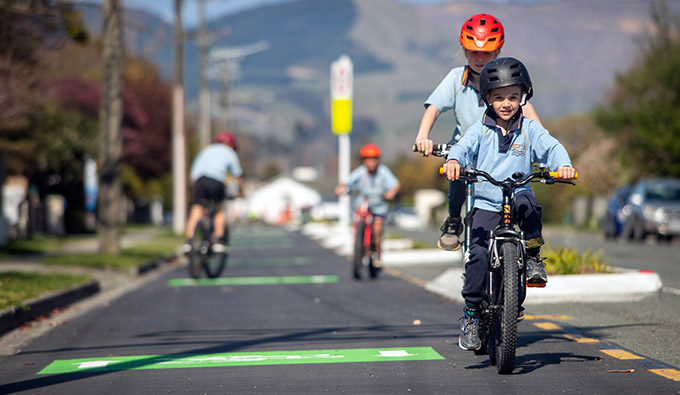We have less than a decade to accelerate our emissions reductions to avoid the full effects of global warming. In Nelson, projected changes to our climate will impact our economy, infrastructure, natural environment, lifestyles and future.
Acknowledging the need for urgent action, Council declared a climate emergency in May 2019. Our response prioritises working in partnership with iwi, central government, business, schools, community groups, households and individuals to improve the resilience of the Nelson region. Responding to climate change is central to Te Tauihu Intergenerational Strategy’s vision of being good ancestors, as the greatest challenges will be faced by our tamariki.
This section outlines some of our plans but many other projects across all areas of Council’s work are making a contribution to reducing our greenhouse gas emissions and improving community resilience. Council’s entire work programme is viewed through a climate change lens. Actions and choices which support our climate change response have been woven throughout all our activities.

The data compiled by New Zealand’s Climate Change Commission (climatecommision.govt.nz) demonstrates that we are already experiencing the effects of climate change and that past emissions have locked in further change. The evidence in the Commission’s 2021 report to the Government shows that to limit warming to 1.5°C will require rapid emission cuts of greenhouse gases between now and 2030, then slower reductions until the end of the century. To achieve our goals the response must be multifaceted:
We need to:
- Quickly decrease our emissions to create a zero carbon future
- Consider how we live with the effects of the emissions already in the atmosphere
- Create a safe and secure future for all by implementing strategies which will allow us to both reduce future impacts and adapt to an already changing climate
- Demonstrate leadership by using evidence- based knowledge, prioritising innovation, and embracing a partnership approach.

Our Plans
How we will live and work:
By making smart choices over the next 10 years, including capitalising on new technology, we can improve our resilience and create a smart, sustainable city.
- Encouraging more inner city living and intensification to reduce traffic and congestion as well as support a more dynamic City Centre.
- Progressing a transition towards a regenerative economy through Project Kōkiri 2.0 - the second phase of the region’s COVID-19 economic recovery plan
- Supporting initiatives such as Businesses For Climate Action, who aim to get 1000 local businesses to measure and reduce their carbon footprint
- Implementing an Urban Greening Plan to expand our urban canopy, bringing more CO2 absorbing plants and trees into our City Centre while reducing air and noise pollution, supporting biodiversity and food resiliency
- Participating in and supporting the Nelson Tasman Climate Forum to deliver on the Regional Climate Action Plan
- Building the proposed new library to a high Green Star rating, including a low carbon footprint, sustainable materials and energy efficient design (click here for more information)
- Refurbishing Civic House (for an estimated $18.3 million over eight years) to improve its environmental performance, its functionality, and to create a healthy working environment. Our focus will be on reducing the carbon footprint) of the building, decreasing energy use (through efficiency and design measures), and increasing its resiliency to climate change
- Working with partners to investigate the opportunity to develop a Nelson Climatorium as a centre of innovation in tackling climate change (click here for more information)
- Considering climate change adaptation across Nelson through the development of the Draft Whakamahere Whakatū Nelson Plan. Check our website to be part of conversations about this Plan
- Investing $52 million in our future resilience through projects to reduce flooding and coastal inundation.
Transport is one of the sectors where we can make the biggest reductions in CO2 emissions (47% of New Zealand’s CO2 emissions were from transport in 2018).
- Continuing investment to support a shift away from single occupancy use of private vehicles towards public transport, cycling and walking between home, work and recreation e.g. $3.5 million to improve shared walk/cycle paths (more information)
- Following an electric first policy when replacing/ adding cars to Council’s fleet
The gas produced from the decomposition of organic material in landfills is roughly 50% methane and 50% CO2. Methane traps approximately 30 times more heat in the atmosphere over a 100- year period than CO2 so it is important we reduce methane emissions. The following projects are funded from the fees paid at the refuse centre (waste levy):
- Allocating $13.3 million in the Plan for collection of kitchen waste at the kerbside for composting, if our current trial is successful. This is part of Council’s commitment to supporting Nelson as a Good Food City and our aim to reduce waste to landfill by 10% per capita by 2030
- Encouraging reuse of products e.g. through our Second Hand Sunday events
- Establishing a grants programme to support everyone in our community to reduce waste
- Delivering a range of workshops and activities through the Rethink Waste programme, including support for Enviroschools.
Restoring biodiversity is a major way of storing carbon. Healthy ecosystems can mitigate climate change impacts such as absorbing excess flood water or buffering us against coastal erosion and extreme weather events.
- Planting trees and restoring native forests to help capture and store CO2
- Funding for the Brook Waimarama Sanctuary to support biodiversity and the education of future generations on the importance of protecting our natural spaces
- Funding through the Jobs for Nature programme to restore the Maitai River (for more information)
- Implementing the Ecological Restoration Plans through an intensive weed ‘knockdown’ period (more information)
Key Issue
We see many opportunities in our climate change response because it also allows us to restore local biodiversity, build sustainable urban environments, take better care of our soil and water, promote healthy lifestyle choices, support mental health and improve wellbeing by creating connected communities within a more liveable City.
Council considers that the funding it has allocated is necessary to meet the requirements of the Climate Change Response (Zero Carbon) Act and the need to support community resilience to climate impacts.

What are the alternatives?
An alternative would be not to make provision for flooding and coastal inundation projects related to climate change. This would be a saving of $52 million in debt and saving on rates of $2.7 million per annum However Council believes it is necessary when doing physical works to build in climate change resilience in order to protect the community from future impacts.
There has been a strong community voice over many years asking Council to be proactive and show leadership on the issue of climate change. This is Council's preferred option. Do you think we should be more cautious and wait to see what Government direction and funding is planned or should we be proactive and move ahead with investments in a range of mitigation, adaptation, resilience, leadership and innovation actions?




